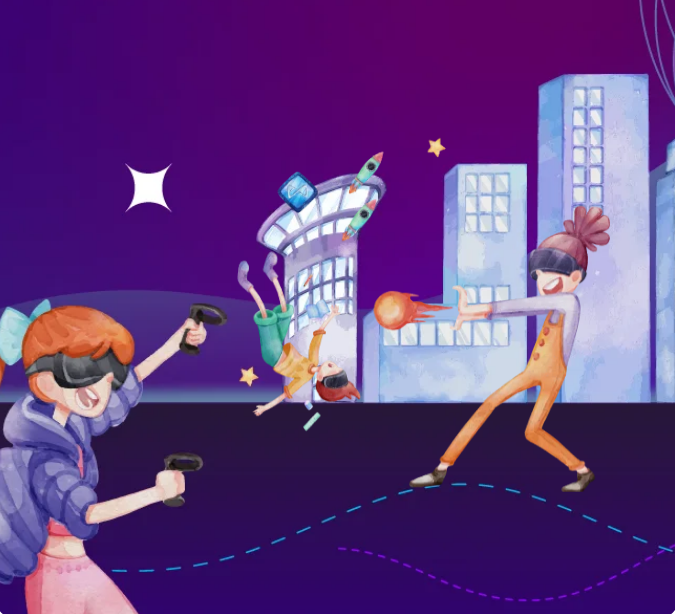Gaming is only one of the many industries that Web3 has revolutionised.
Web3-based games offer players new, decentralised ways to connect with games.
Web3 gaming allows users to play games while earning bitcoins and NFTs.
By distributing control over governance to players rather than a single centralised authority, it seeks to democratise many facets of the game.
The most recent noteworthy advancement in the field of developing blockchain applications is Web3.
The Difficulties facing the conventional gaming industry
Even though in traditional gaming, in-game material or digital assets can be bought with real money or claimed as rewards, game developers still retain ownership of the in-game content’s copyrights.
In essence, gamers don’t have any ownership rights to those digital items used in-game. Instead, in the conventional ecology, player ownership just confers the right to take part in specific game mechanics.
Additionally, all game-related data is kept on centralised gaming servers that are entirely under the authority and management of game administrators.
The ability to supervise and assist a transaction in which players seek to exchange their digital products for cash is something that game developers need.
Due to the inefficiency of centralised servers and conventional games, grey markets have developed, creating opportunities for hackers and con artists. They exploit gamers while giving neither developers nor administrators any advantages. Administrators do not safeguard gaming platforms and players from shutdowns and cyberattacks. Due to the centralised server’s poor defences against attacks, the digital assets are also vulnerable to theft, loss, and fraud.
How Web3-based gaming powered by (Blockchain) Proves to be a Viable Solution
Web3 gaming blends play-to-earn, crypto-secured gaming wallets, play-to-win, gaming DAOs with decentralised gaming ecosystems, blockchain-based game asset ownership, and metaverse gaming to solve these difficulties.
Gaming on the web3
Web3 gaming decentralises a gaming ecosystem or platform’s functions, including asset ownership and decision-making.
The Web3 Game Development allows players to express their thoughts on when and how the game should continue and are made possible by integrating blockchain technology into the gaming environment.
Web3 gaming allows users to trade assets, game tokens, and cryptos while playing.
By enabling players to access and own in-game digital assets, web3 gaming levels the playing field for the gaming industry. These materials are kept as gaming NFTs and are special in their own right.
Web3 gaming also enables a broad spectrum of interoperability among various gaming ecosystems by connecting in-game assets and players across platforms.
Depending on the type of blockchain platform utilised to create a gaming environment, the interoperability degree will vary. Examples of cross-chain communication bridges that offer interoperability are Polkadot and Solana.
Ownership Management and Data/Asset Interoperability Protocols
The biggest opportunity for gamers in the Web3 metaverse is the ability of blockchains and NFTs to provide true ownership and interoperability in gaming.
The popularity of NFTs, the new face of Web3 gaming, has skyrocketed recently.
This is because they provide something that earlier gaming platforms did not: the chance to actually own almost any kind of distinctive in-game asset or object.
In older video games, a player would spend real money to purchase unique in-game items. But what happens if the same player switches to a different game? It was a waste of time and money to gather the thing or collection of things. Everybody has been there.
Think about all the gaming equipment that is currently being wasted online.
Interoperability is the greatest solution for Web3 gaming. Gamers no longer have to spend money for these products because they can be transferred between games. Players now have more freedom and can switch between as many games as they like.
If a player decides they no longer want to carry that item or find it useful, there’s no need to be concerned.
They might just decide to sell it on secondary markets, making in-game NFTs a long-term investment as opposed to a one-time purchase.
Experiences in Unusual Games for Players
The best players in Web3 gaming show how the new gaming environment benefits from experiences that are tailored to users’ preferences. T
here are many significant attributes of web3 games that concentrate on giving gamers the biggest advantages possible.
The play-to-earn games, for instance, show players how to maximise games in order to profit financially.
Web3 games’ self-sovereignty feature emphasises how they take player advantages into account.
An increase in accessibility and transparency
One of the things that defines “what is web3 gaming” the most clearly is the distributed character of the process.
Unlike the centralised servers of typical games, you don’t have a single point of failure.
Furthermore, blockchain-based games need voter consensus to better the gaming experience.
Web3 games can therefore offer more transparency.
Additionally, the web3 game ecosystem offers exceptional availability thanks to its independent operations and minimal participation from the central government.
For increased scalability and decreased downtime, you can also profit from block minting and highly resilient data storage facilities.
Traditional games are incorporated
Web3 gaming modifies older game models for metaverse and blockchain platforms.
Each player has a favourite game, and gaming is a very individualised experience.
Web3 proposes bringing popular old games to the metaverse, where players can design avatars and trade in-game items.
Conclusion
Web3 gaming has completely altered the gaming landscape by integrating blockchain and metaverse technology.
By eliminating centralised platform owners and game administrators, it has democratised the gaming business.
Additionally driving the financial aspect of the gaming industry is web3 gaming. It does this by utilising innovative technologies like the metaverse, DAO, and blockchain.
Web3 gaming thus represents a development in the transition of the digital game industry.

